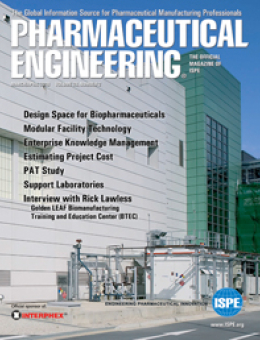
Downloads
Volume 28, Number 2
Table of Contents
Articles
Biopharmaceutical Process Characterization: Defining the Design Space
by Anthony Newcombe, Keith Watson, Claire Newcombe
This article presents an overview of the current regulatory guidelines for pharmaceutical development and evaluates the application of Process Analytical Technology (PAT) and experimental design as tools to expedite biopharmaceutical process characterization.
Innovation Diffusion within the Pharmaceutical Manufacturing Industry: A Study on the Adoption of Modular Facility Technology
by Gordon Leichter, Tao Gao
This article reports summary findings of an empirical study on the factors that influence people’s decision to adopt a complex innovation within the pharmaceutical manufacturing industry, namely modular facility technology.
Enterprise Knowledge Management for Operational Excellence
by Janice Abel
This article presents how important it is to be able to easily integrate applications, information, and systems in pharmaceutical facilities globally.
Stage Gated Approval Processes – A Practical Way to Develop and Filter Capital Investment Ideas
by Gordon R. Lawrence
This article presents reasons how and why a stage gated approach to capital project approval is efficient in terms of both time and money. It also dispels some of the common misconceptions about such an approach.
Industry Interview Series: Rick Lawless, Associate Director, Strategic Support, Golden LEAF Biomanufacturing Training and Education Center (BTEC)
In this interview, Rick Lawless discusses in detail the making and the mission of BTEC in North Carolina, USA, the only center of its kind in the nation that provides hands-on biomanufacturing training and education on state-of-the-art equipment, techniques and methods.
PAT Study of a Drug Manufacturing Design Space: Effect of Blend Flow Rate and API Level on Homogeneity and NIR Measurements
by Nicolas Abatzoglou, eacute;bastien Simard, Carlo Benedetti
This article presents the results of a study on two critical process parameters – flow velocity and initial blend API level – through designed experiments in an effort to map part of the process design space for a commercial formulation from a Process Analytical Technology/Quality by Design perspective.
Good Design Practices for Pharmaceutical Manufacturing Facilities: Chapter 21 Support Laboratories
by Terry Jacobs
This article is a reprint of Chapter 21 from the book, Good Design Practices for Pharmaceutical Manufacturing Laboratories, and is printed with permission from the publisher, Informa Healthcare, copyright June 2005.
Departments
- New Products and Literature
- Industry and People
- ISPE Update
- Classified Advertising
- Global Regulatory News
Supplement
2008 Facility of the Year Awards
Five pharmaceutical manufacturing facilities located in Germany and the United States were selected as Category Winners.
NOTE: Pharmaceutical Engineering article PDF documents are not to be posted on any Web site, blog site or page, or any other internet site without prior permission from ISPE. (Copyright © ISPE. All rights reserved.)